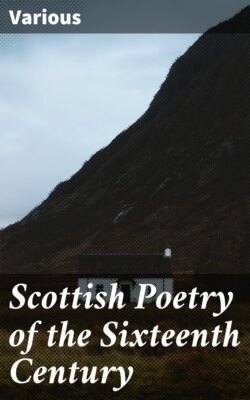Читать книгу Scottish Poetry of the Sixteenth Century - Various - Страница 7
На сайте Литреса книга снята с продажи.
Complaynt of the Commounweill of Scotland.
ОглавлениеAnd thus as we wer talking, to and fro,
We saw a bousteous berne cum ouir the bent[60],
Bot[61] hors, on fute, als fast as he mycht go,
Quhose rayment wes all raggit, revin, and rent,
With visage leyne, as he had fastit Lent:
And fordwart fast his wayis he did advance,
With ane rycht melancolious countynance,
With scrip on hip, and pyikstaff in his hand,
As he had purposit to passe fra hame.
Quod I, “Gude-man, I wald faine understand,
Geve that ye plesit, to wyt[62] quhat were your name?”
Quod he, “My Sonne, of that I think gret schame,
Bot, sen thow wald of my name have ane feill[63],
Forsuith, thay call me John the Commounweill.”
“Schir Commounweill, quho hes yow so disgysit?”
Quod I: “or quhat makis yow so miserabyll?
I have marvell to se yow so supprysit[64],
The quhilk that I have sene so honorabyll.
To all the warld ye have bene profitabyll,
And weill honourit in everilk[65] natioun:
How happinnis now your tribulatioun?”
“Allace!” quod he, “thow seis how it dois stand
With me, and quhow I am disherisit
Of all my grace, and mon[66] pass of Scotland,
And go, afore quhare I was cherisit.
Remane I heir, I am bot perysit[67];
For thare is few to me that takis tent[68],
That garris[69] me go so raggit, rewin, and rent:
“My tender freindis are all put to the flycht;
For Policye is fled agane in France.[70]
My syster, Justice, almaist haith tynt[71] hir sycht,
That scho can nocht hald evinly the ballance.
Plane wrang is plane capitane of ordinance,
The quhilk debarris laute[72] and reasoun;
And small remeid is found for open treasoun.
“In-to the South, allace! I was neir slane;
Ouer all the land I culd fynd no releif.
Almoist betuix the Mers and Lowmabane
I culde nocht knaw are leill man be ane theif.
To schaw thair reif[73], thift, murthour, and mischeif,
And vicious workis, it wald infect the air,
And als langsum[74] to me for tyll declair.
“In-to the Hieland I could fynd no remeid,
Bot suddantlie I wes put to exile:
Thai sweir swyngeoris[75] thay tuke of me non heid,
Nor amangs thame lat me remane are quhyle.
Als, in the Oute Ylis, and in Argyle,
Unthrift, sweirnes, falset, povertie, and stryfe
Pat Policye in dainger of hir lyfe.
“In the Lawland I come to seik refuge,
And purposit thare to mak my residence;
Bot singulare profeit gart[76] me soune disluge,
And did me gret injuries and offence,
And said to me, ‘Swyith[77], harlote, hy thee hence,
And in this countre see thow tak no curis[78],
So lang as my auctoritie induris.’
“And now I may mak no langer debait;
Nor I wate[79] nocht quhome to I suld me mene[80];
For I have socht throw all the Spirituall stait,
Quhilkis tuke na compt for to heir me complene.
Thair officiaris, thay held me at disdene;
For Symonie, he rewlis up all that rowte;
And Covatyce, that carle, gart bar me oute.
“Pryde haith chaist far frome thame Humilitie;
Devotioun is fled unto the Freris;
Sensuale plesour hes baneist Chaistitie;
Lordis of religioun, thay go lyke seculeris,
Taking more compt in tellyng thair deneris[81]
Nor thai do of thair constitutioun.
Thus are thay blyndit be ambitioun.
“Our gentyll men are all degenerat;
Liberalitie and lawte boith ar lost,
And Cowardyce with lordis is laureat,
And knychtlie Curage turnit in brag and boast.
The civele weir misgydis everilk oist[82];
Thare is nocht ellis bot ilk[83] man for hym-self;
That garris me go, thus baneist lyke ane elf.
“Tharefor, adew: I may no langer tarye.”
“Fair weill,” quod I, “and with sanct Jhone to borrow[84]!”
Bot, wyt ye weill, my hart was wounder sarye[85]
Quhen Comounweill so sopit[86] was in sorrow.
“Yit efter the nycht cumis the glaid morrow;
Quharefor, I pray yow, schaw me in certane
Quhen that ye purpose for to cum agane.”
“That questioun, it sall be sone decydit,”
Quod he, “thare sall na Scot have confortyng
Of me tyll that I see the countre gydit
Be wysedome of ane gude auld prudent Kyng,
Quhilk sall delyte him maist, abone[87] all thyng,
To put Justice tyll executioun,
And on strang traitouris mak punitioun.
“Als yit to thee I say ane-uther thyng:
I see rycht weill that proverbe is full trew,
‘Wo to the realme that hes ouer young ane King!’ ”
With that he turnit his bak, and said adew.
Ouer firth and fell[88] rycht fast fra me he flew,
Quhose departyng to me was displesand.[89]
With that, Remembrance tuk me be the hand,
And sone, me-thocht, scho brocht me to the roche
And to the cove quhare I began to sleip.
With that, one schip did spedalye approche,
Full plesandlie saling apone the deip,
And syne[90] did slake hir salis and gan to creip
Towart the land, anent[91] quhare that I lay.
Bot, wyt ye weill, I gat ane fellown fray[92]:
All hir cannounis sche leit craik of at onis:
Down schuke the stremaris frome the topcastell;
Thay sparit nocht the poulder nor the stonis[93];
Thay schot thair boltis, and doun thair ankeris fell;
The marenaris, thay did so youte[94] and yell,
That haistalie I stert out of my dreme,
Half in ane fray, and spedalie past hame.
And lychtlie dynit, with lyste[95] and appetyte,
Syne efter past in-tyll ane oratore,
And tuke my pen, and thare began to wryte
All the visioun that I have schawin afore.
Schir, of my dreme as now thou gettis no more,
Bot I beseik God for to send thee grace
To rewle thy realme in unitie and peace.
